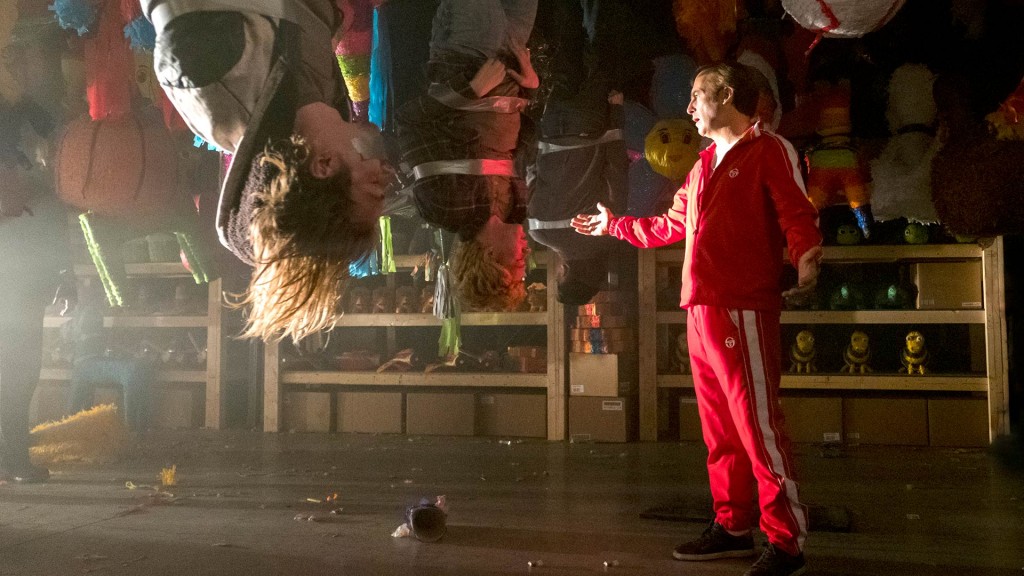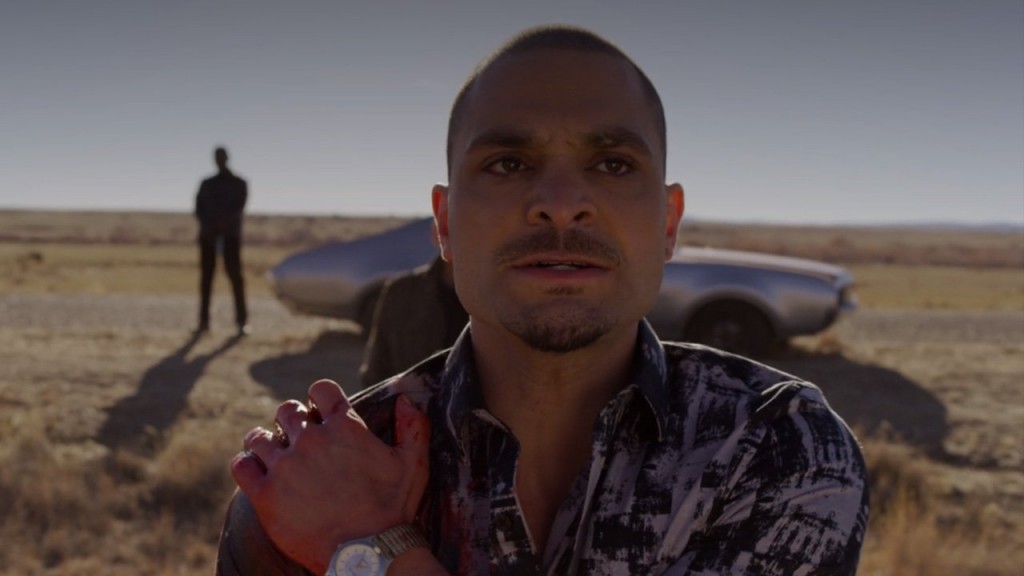-
Recent Posts
- Better Call Saul: There Are No Happy Endings between a “Rock and Hard Place”
- Black Widow Keeps It in the Family for Natasha’s Last Ride
- Loki Finds New Purpose in the Man behind the Mischief
- In its Debut, Star Wars: The Bad Batch Decides Whether to Obey or Rebel
- Nomadland: A Film Out of Time, For Our Times
Archives
Recent Comments
- Ed Clarke on Contact
- Matt on Why “The Frying Game” Is a Dark Horse Contender for The Simpsons’s Worst Episode Ever
- Lilly Dow on Contact
- Stacey on Veep’s Series Finale and the Hollowness of Getting What You Want
- Evan Jaocbs on Contact
Meta
Tag Archives: Gus Fring
Better Call Saul: There Are No Happy Endings between a “Rock and Hard Place”
It’s a fool’s errand to wish for happy endings in the world of Better Call Saul. But I had a faint bit of hope for Nacho Varga. I thought maybe, just maybe, he would find some way to get out. He could leave this life behind and start again with his father by his side. I even imagined Jesse Pinkman arriving in Alaska years later and meeting Ignacio under an assumed name. Wouldn’t that be nice? Mike’s two surrogate sons coming together, looking after each other the way he might have done himself.
(more…)Better Call Saul: The Clash of the Personal and the Professional in “JMM”
It’s supposed to just be business. You come in. You sign the forms. You check the boxes. You pay the fine. What you don’t do is get sentimental. There are practical reasons to take this step — reasons that, not coincidentally, help preserve your ongoing safety and non-incarceration.
But then you look at the person standing across from you, someone whose joy and pain matters to you, and all of a sudden, it’s impossible to pretend that this is just a ministerial act or some necessary concession to the gods of legal privilege and bureaucracy. Instead, it becomes something more, something meaningful, something personal, with an emotional charge and an attendant importance that elevates it above business as usual.
Better Call Saul: When Something Means More Than Just Business in “Dedicado a Max”
We’re used to Jimmy McGill pushing limits and crossing lines. Time after time, Better Call Saul serves up scenarios where its title character faces two options: do things the safe and expected way, or do them the Saul Goodman way. The latter might gain Jimmy a little more, but it’s also riskier and sometimes even dangerous.
For once, though, it’s Kim taking that type of risk. She’s obviously no stranger to participating in Jimmy’s schemes and even concocting some of her own. But she’s also always had a limit, a certain line she refused to cross, even if doing so would get her what she wanted. It’s in Jimmy’s nature to cheat and finagle and squeeze the last bit of juice out of everything. It’s in Kim’s to dabble in those conman ways, even excel at them, but to ultimately come back to the light.
Better Call Saul: The Good Guys and Bad Guys Fight the Same Fight in “Namaste”

If there’s a persistent thematic undercurrent that touches each part of Better Call Saul (and maybe even Breaking Bad), it’s that people from very different walks of life are not all that different. Respected and superficially decent men like Chuck McGill and Walter White can be cruel and self-serving. Those on the margins of society like Nacho Varga and Jesse Pinkman can be intelligent and empathetic. And crime bosses and young attorneys can be equally determined, equally dogged, and equally committed to doing what they must to win the long game.
Better Call Saul and the Lines We Cross for Those We Love in “50% Off”
People will go to incredible lengths if something really matters. When someone or something important hangs in the balance, it stirs the blood, pushes us to take chances we wouldn’t otherwise take, and cross lines we wouldn’t normally transgress.
That’s certainly true for Nacho here. If he’s had one consistent character trait over the course of Better Call, it’s that he’s apt to keep things stable and not rock the boat unless he has to. He’s more thoughtful and more calculating than the hot-blooded Salamancas he answers to. But his other consistent throughline is how much he loves his father. That means Nacho will take chances and put himself at risk in ways that he wouldn’t normally do, if it allows him to protect the man who raised him.
Better Call Saul: The Beginning and End of Saul Goodman in “Magic Man”
Five seasons in, and I still don’t know what to make of the flash-forwards to Cinnabon Gene. I always think of The Wire’s approach to these opening vignettes, with the idea that they’re meant to be microcosms of the themes of the season. But that doesn’t seem to fit here, since Gene’s choices largely track with Jimmy’s in the show to date. The cold open shows Gene panicking, worrying that he’s in too deep and looking for a way out, only to decide to take matters into his own hands. That’s been Jimmy’s M.O. for basically the whole series, most recently and notably overcoming his disciplinary suspension despite some serious headwinds.
Better Call Saul: The Slow Burn Threatens to Bring Down Jimmy and Kim in “Something Stupid”
I’ve known the evenings, mornings, and days alone,
I have measured out my life in Mesa Verde awards and burner phones.
With my sincerest apologies to T.S. Eliot, it’s amazing how Better Call Saul can move so slowly and then so quickly in the same season, without missing a beat. It’s hard to know exactly how much time has elapsed in the show so far, but this season picked up right where the last one left off and has, more or less, crept along in the aftermath of Chuck’s death and Hector’s “accident” ever since.
That is, until now. If the last episode stood out for how it seemed to set Jimmy and Kim on diverging trajectories, “Something Stupid” takes that idea up a notch, with a cold open set to the famed Sinatra melody that provides the episode’s title. The series taps into its unrivaled ability to craft montages, depicting the passage of time via unwrapped statuettes, filing cabinet labels, and holiday sale signs. But the show goes a step further with its formal creativity, using a well-placed split screen to show how both Kim and Jimmy are flourishing in their new lives, but also how those lives are slowly but surely pulling them further and further apart.
Better Call Saul Sets Jimmy and Kim on Different Paths in “Piñata”
Jimmy and Kim are on different paths; that’s been clear for a while now. But the cold open in “Piñata” makes it literal. The episode starts with a flashback to the halls of HHM, at a time when Jimmy is a gregarious mailroom clerk and Kim’s a precocious law student. Even then, the two share a rapport, but also have obvious differences.
Better Call Saul: Nacho and Kim Are in Too Deep in “Something Beautiful”
The end of “Something Beautiful” makes me think of a scene from “Nailed”, the penultimate episode of Better Call Saul’s second season. In that episode, Chuck McGill confronted Kim and Jimmy about the suspected switcheroo with the Mesa Verde files. He impugned his brother’s character and told Kim to open her eyes, saying that Jimmy committed these misdeeds for her as part of a “twisted romantic gesture.”
But Kim defended Jimmy. She admitted that he’s not perfect, but argued that he was still a good person and someone she pitied in light of how much he ached for his brother’s love, a love that he would never get. She chastised Chuck for denying Jimmy that and for judging him, for threatening to inflict such consequences on him, and denied Chuck’s theory as crackpot. But then, when she was alone with Jimmy, she betrayed her true feelings. She punched Jimmy in the arm. She expressed her frustration, because she’s no fool; she knew he did it, and she thought that Chuck was right — that he did it for her.
Better Call Saul and the Choices We Don’t Have to Make in “Breathe”
One of the most interesting questions to ask — for both real people and characters on television — is why someone chooses to do things they don’t have to. The realities of life can push people toward certain choices, and circumstances often dictate actions. But there are situations in which there’s no external force, no rules or sticks or carrots to poke or prod, just a raw choice to be made. It’s these sorts of choices that can reveal who someone really is and what they’re going through, in a way that’s clearer than with choices that are muddied by pressure and inertia and need.
These are the types of questions that “Breathe” is interested in. Why is Gus Fring not only trying to keep Hector Salamanca alive, but also moving against those who tried to kill him? Why is Kim Wexler attending a meeting to determine Jimmy’s share of Chuck’s estate when Jimmy himself is blowing it off? Why is Mike Ehrmantraut determined to perform his “security consultant” routine on all of Madrigal’s outposts despite Lydia’s objections? And why is Jimmy McGill ready to talk himself out of a job, one he’d just hustled like crazy to earn?









